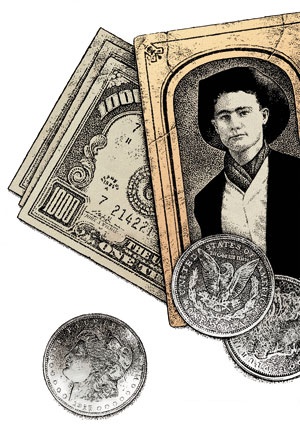Texas is known for its outlaws, from Sam Bass to Bonnie and Clyde. But the most successful bank and train robbers of them all were members of the Newton Gang.
Compared to the Newtons, John Dillinger was a two-bit operator, Jesse and Frank James were amateurs and Butch Cassidy was a small fry. The Newtons made blowing safes and robbing trains big business and pulled off the largest train robbery in U.S. history.
Willis Newton, born in 1889, was the sixth of 11 children born to a farming family in Cottonwood in Callahan County. He and his brother Wylie, known as Doc, didn’t take to farming. They preferred to steal the cotton (Willis maintained that Doc did it) that other farmers grew. That brought them a two-year prison sentence. They escaped, were recaptured and served almost five years.
Willis pulled his first train robbery near Uvalde in 1914, making off with $4,700. For the next five years he and his gang, operating at night, blew open safes in stores and banks all over Texas and as far north as Michigan. The youngest Newton, 19-year-old Joe, joined him in 1920, and a year later, brothers Jess and Doc made it a family business.
Willis was the CEO. Through payoffs, he arranged dropped charges, inside information, shortened sentences, paroles and at least two governors’ pardons. He chose the target banks and trains, directed the research—which could take several months—hired the extra men when needed, scouted the hideaways, choreographed the operations, disposed of the bonds they took and divvied the proceeds.
The Newtons carried pistols and sometimes shotguns for persuasive purposes, but remarkably, they never killed anybody.
The gang preferred to work in small towns, where security was lax, there weren’t many people, and police forces were small and ineffectual. This was the early 1920s; new, round burglarproof safes were just being introduced, replacing the old square ones that blew open with a shot of nitroglycerin. Even the most powerful automobiles strained to go 60 mph. Telephone and burglar-alarm wires were easily cut. After a late-night job, the Newtons would hide in a predetermined cornfield or woods until nightfall the next day, then be picked up by an accomplice after dark.
Nor did they mind having spectators watching them work. They arrived in San Marcos in the early morning of January 5, 1924. Their target was the First State Bank. Five men cut wires and stood guard in the streets while two broke in through the bank’s front door. At 3:30 a.m., their first shot of nitro blew the vault door 20 feet through the building and woke up the neighborhood. For the next 45 minutes, as six more explosions broke open one safe and failed to crack a second, about a dozen people watched the entire operation from apartment windows and a bakery across the street. Those who ventured outside or came upon the scene on their way to work were persuaded to go inside. At 4:15 a.m. the two safecrackers emerged carrying sacks containing $24,000. One whistled, and the gang’s guards came out of the darkness, and they all walked calmly out of town.
The Newtons’ career culminated on June 12, 1924, when they pulled off the biggest mail train robbery in U.S. history just outside Chicago, making off with $3 million. But brother Doc was accidentally shot by one of the gang’s longtime confederates during the holdup, and they had to hole up in a Chicago apartment while he was patched up. That’s where they were nabbed. Most of the money went to payoffs and returns to the insurance company in exchange for lighter sentences in Leavenworth federal prison.
Willis owned real estate in Chicago, gas stations and nightclubs in Tulsa, and ran whiskey into dry Oklahoma. Ironically, he and Joe served time for an Oklahoma bank robbery they didn’t do; their reputations convicted them. Doc did a stretch for trying to break into a gun shop when he was 77. Jess worked on ranches in Mexico and Oklahoma.
All four of the Newtons wound up in Uvalde, where Willis and Joe became local celebrities and living museum exhibits, giving talks about the good old days. Willis died in 1979 at the age of 90. Joe died 10 years later at 88. Jess died in 1960 at 73, and Doc died in 1974 at 83.
——————–
Norman L. Macht wrote about the history of major-league baseball spring training in the March issue.


